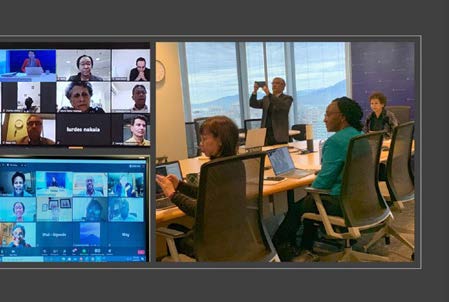Download the digital version (PDF) from OAsis
Sign up to receive email updates from COL
COVER STORY
Education during COVID-19: the Commonwealth response
“Pandemics, natural disasters and social/political unrest are realities that
countries will continue to face in the future.”
In just a few months, COVID-19 has turned whole educational systems upside down. At the height of the pandemic, an estimated 574 million students across the Commonwealth were out of school due to closures. Distance and online learning became the primary means to keep the doors of learning open, and for many, it was uncharted territory.
Despite these formidable challenges, the Commonwealth was quick to respond – improvising and implementing new approaches to teaching and learning in a matter of days. In many Member States, education ministries targeted children with stepped-up digital and broadcast lessons and launched virtual learning portals for teachers, students and parents.
Past examination papers have been regularly published in the Guyana Chronicle, and the Namibia Reads digital reading app has been made accessible for the entire country. In India, the SWAYAM MOOC platform has provided learning continuity online, and in Fiji, parents and guardians were encouraged to access educational materials via the Walesi platform, available on their smartphones.
The current challenge of COVID-19 has provided governments and institutions with an opportunity to rethink their approach to education. Pandemics, natural disasters and social/political unrest are realities that countries will continue to face in the future. As Member States are coming out of lockdowns and are slowly reopening their institutions, they can start thinking about ways to build education systems that can permanently withstand these shocks.
To help Member States draw lessons from the COVID-19 experience and identify factors that will make education more resilient in the future, COL has produced the Report to Commonwealth Education Ministers: From Response to Resilience.
It is available on OAsis, COL’s institutional repository, at http://hdl.handle.net/11599/3592
Online consultations with COL Focal Points
COL held regional online consultations with its Focal Points (FPs) to engage these key stakeholders in the development of its new strategic plan (2021-2027) and ensure its initiatives continue to match regional and national priorities. Representatives from Africa, Asia, Europe and the Pacific discussed ways in which COL can help build the resilience of educational systems in the face of pandemics and climate change.
Capacity building for teachers at all levels emerged as a key priority, with participants noting the need for new blended learning approaches and expanded use of online learning resources. Developing 21st-century skills for employability and entrepreneurship, using blended learning approaches in TVET, and increasing learning delivery through standard communication channels, such as radio and television, were identified as other key priorities. Participants in the consultations stressed the need for increased focus on vulnerable populations and youths and welcomed the idea of peer learning exchange among FPs from various regions.
International Partnership of Distance and Online Learning for COVID-19

Considering the strengths of distance and online learning to provide workable solutions, and recognising the need for collaboration to serve these demands, COL has brought together institutions and organisations committed to supporting learning at this time of crisis. Through this new initiative, over 55 institutions and organisations across the world are enjoying access to pooled resources and online training, sharing expertise and facilitating collaborative projects. Find out more at: https://opendoor.col.org/
IN BRIEF
CEMCA webinars in response to COVID-19

In response to the COVID-19 lockdowns in most countries in the Asia region, CEMCA organised webinars on Cybersecurity in Online Learning and Artificial Intelligence and the Future of Jobs. They were led by well-known experts Dr Pavan Duggal, Honorary Chancellor, Cyberlaw University, and Dr Manish Gupta, Head of Research, Google, India, and brought together some 260 participants.
OER for online learning

COL has developed a four-week course on Using Open Educational Resources for Online Learning as a response to the needs of teachers forced to move their classes online. With an overview of useful resources, applications and guidelines, which can be freely accessed online, the course provides a foundation for further engagement with online and blended learning. It has already been offered to teachers in the Pacific and the Caribbean.
Design and development of MOOCs
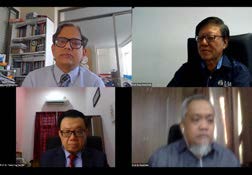
A face-to-face workshop on designing and developing MOOCs initially planned for the Universiti Malaysia Sabah was converted into a series of 12 webinars for global audiences. The online sessions were facilitated by experts from Canada, New Zealand, South Africa, the United Kingdom and the USA.
New mentoring programme for women leaders
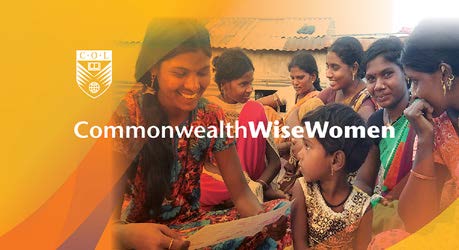
A new mentoring programme will help build the future generation of leaders among women and girls from underserved communities across the Commonwealth. Through CommonwealthWiseWomen, COL is leveraging tools and resources to support women’s empowerment and lay the foundations for their success. For a period of six months, mentees will be paired with successful and influential women to map their future paths. Each mentee has also received a free licence to master new skills via Coursera. For more information about this new initiative, please visit:
Women in rural PNG gain livelihood skills
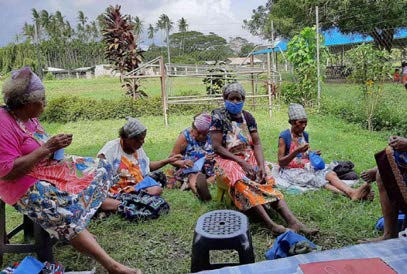
GIRLS Inspire: changing lives one at a time
GIRLS Inspire has shone a light on the plight of vulnerable women and girls, many of whom are victims of child and forced marriage. These young women now have agency to stand up for themselves and are empowered to follow their dreams.

Beenish (Pakistan) was married at 16 and endured years of physical and psychological abuse. This left her isolated from her family and friends and disillusioned about her future. A life-changing break came when she enrolled in the free vocational and life-skills training supported by COL through its partner, SPARC. Now, Beenish has a job as a beautician and plans to open her own salon.
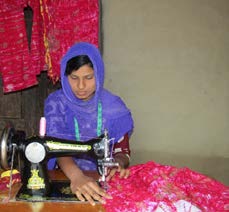
Mahana (Bangladesh) is 17 years old and had dreamed of being a tailor. Due to poverty, she dropped out of secondary school, and her parents wanted to marry her off. With COL’s support, she was able to get a new start and complete skills training through the boat school programme run by Shidhulai Swanirvar Sangstha. Mahana has now purchased a sewing machine and started making clothes for women and children. She is supporting her family and has returned to school.
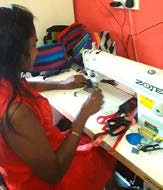
Ruwanthi (Sri Lanka) was at her lowest point when she was referred to COL’s partner, the Women’s Development Centre. Divorced and with a young daughter in her care, this 26-year-old was financially destitute. Through counselling assistance and self-employment training, she was able to regain her confidence and jumpstart her career. Having learned new skills in design, sewing and product upcycling, she has now become an instructor in bag-making.
Sandhya (India) comes from a poor household and got married at the age of 14. Fleeing her abusive husband, she returned to her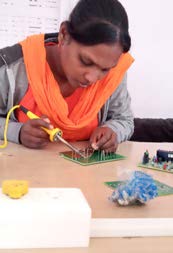 parents’ house and was looking for ways to make a living. Having completed skill-development and financial-literacy courses run by COL’s partner, Mann Deshi Foundation, she now receives many orders to install water pumps and repair solar lamps in her native village.
parents’ house and was looking for ways to make a living. Having completed skill-development and financial-literacy courses run by COL’s partner, Mann Deshi Foundation, she now receives many orders to install water pumps and repair solar lamps in her native village.
Canada’s Athabasca University to host PCF10

COL and Athabasca University, Canada’s online university, will be hosting the 10th Pan-Commonwealth Forum on Open Learning (PCF10) in Calgary in September 2022, marking the first time the international event will be held in Canada. The Forum, which is held every three years, is one of the world’s leading international forums in open, distance and technology-enabled learning, attracting hundreds of delegates from across the Commonwealth and beyond. Since 1999, the Forum has been held in Brunei Darussalam, India, Jamaica, Malaysia, New Zealand, Nigeria, South Africa and the UK.
Q&A with AU President
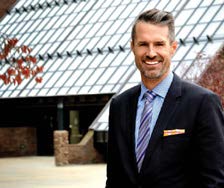
How does online education contribute to building a more resilient education system?
Online technology can be a huge tool for democratising education and creating a more resilient, accessible system. I have heard it said that human potential is equally distributed around the globe, but access to the education needed to harness and fulfill that potential is not.
Online education is an incredible tool to do that. How does Athabasca University put that into practice?
As Canada’s online university (with more than 43,000 learners across our own vast country and around the world), AU is dedicated to removing barriers. We are open to all, regardless of age, educational experience, geographic location, work and life circumstances and commitments. The flexibility to provide learners what they need, when they need it, in the way that works best for them, is key to maximising accessibility and meeting the needs of learners now and in the future.
How has the global pandemic affected the future of education?
It has certainly focused more attention on online education, both for better and for worse. It has highlighted the value and potential of online technology to deliver and democratise education to a broader audience. But the rush to deliver emergency remote education online by so many institutions has given some learners a less-than-optimal experience, potentially undermining our message that online education, when well designed and executed,
Building the capacity of TVET educators in Zambia
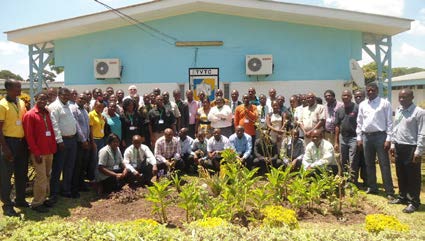
In response to a request from Zambia’s Ministry of Higher Education, COL is working with the Technical and Vocational Teachers College (TVTC) to build the capacity of Zambian TVET educators in online learning. TVTC and ministry staff trained by COL are now working with facilitators from the country’s 27 public institutions using COL’s OER. Through a train-the-trainers model, the facilitators will then train over 800 TVET teachers across Zambia in flexible skills development. Zambia is now able to quickly scale up online learning by using OER-based courses, which COL has successfully offered across the Commonwealth.
Boosting Nauru’s food security
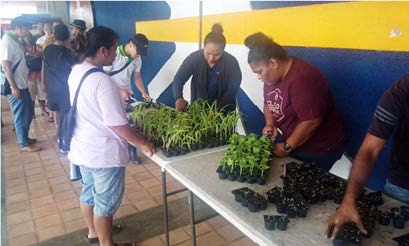
COL is helping Nauru achieve its aspiration to have more than 70% of the average person’s diet sourced locally. In partnership with the local education and agriculture departments and the Taiwanese Technical Mission, it is supporting the development of a mobile app to help communities grow kitchen gardens as one of the strategies to assist in decreasing the country’s reliance on air-freighted fresh produce. A series of recent in-country workshops explored the design, technology options and functionalities of the app, which will share information on how to grow plants effectively, offer cooking tips and recipes, and enable local extension officers to answer questions from the community of backyard farmers.
Skills at scale
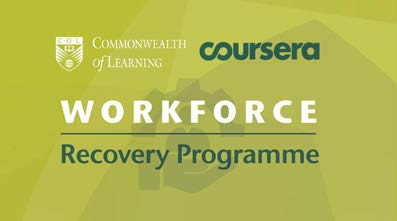
COL has partnered with Coursera to make a difference to the lives of 50,000 Commonwealth citizens whose immediate need is to acquire skills for regaining employment lost due to COVID-19. Commonwealth Member States can enrol their unemployed citizens in any of the 4,000 Coursera courses through to 30 September 2020, and learners can complete courses and obtain certifications by 31 December 2020.
A helpdesk staffed by experts around the world will advise learners on the choice of courses, and provide administrative and academic support, as well as mentorship and counselling. Over 13,000 learners from 44 countries have joined the programme, and 1,300 certificates of completion have been issued to them. For more information, please write to cwr-helpdesk@dev.col.org
Combatting COVID-19 with UNESCO

COL has joined UNESCO and its partners across the globe to provide governments, teachers, students, as well as education and technology specialists with solutions and resources for distance learning during the pandemic. The Global Education Coalition was launched by UNESCO-Paris, while the “Combat COVID-19: Keep Learning. Together We Are on the Move!” initiative is spearheaded by IITE-Moscow. Partner resources can be accessed here: https://iite.unesco.org/combating-covid-19-togetherwe-are-on-the-move/updates/
Blue Economy driving innovative thinking
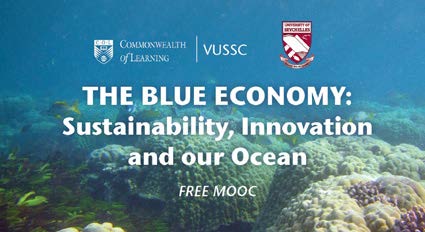
Rapidly growing interest in the environmental and economic benefits of a successful Blue Economy had close to 1,500 learners participating in a free MOOC delivered by VUSSC in partnership with the University of Seychelles (UniSey).
The course was launched on World Oceans Day and incorporates discussion forums and quizzes, along with videos and readings. It illustrates how and why the Blue Economy concept is driving innovative thinking, and is designed as an introduction for persons from a wide variety of backgrounds.
Participants from over 70 countries joined the MOOC, with the largest representation from India and countries of the Pacific and Caribbean regions. The course serves as the foundation for three further Blue Economy MOOCs that COL and UniSey will be offering later this year.
COL Chairs webinar series

The COL Chairs webinar series, Responding to COVID-19 and Beyond, featured Professors Mohamed Ally (Athabasca University, Canada), Mpine Makoe (University of South Africa), George Veletsianos (Royal Roads University, Canada) and Martin Weller (Open University, UK) as keynote speakers. The focus was on their respective projects and recent publications, collectively aligned to technology-enabled learning.
Interview with CNBC-Africa
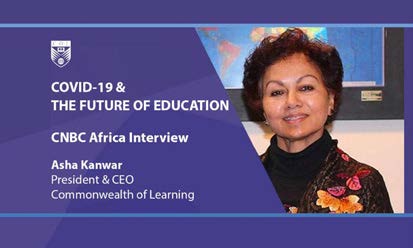
For the full version of the interview, visit: https://tinyurl.com/ybvsc5fq
Launch of Teacher Futures – The Gambia
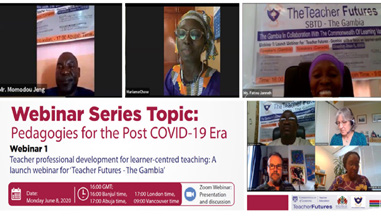
A webinar on Pedagogies for the Post COVID-19 Era marked the launch of Teacher Futures – The Gambia, a school-based teacher development programme enabled by digital technologies and supported by COL. The webinar, which focused on teacher professional development and learner-centred teaching, brought together education leaders, teacher educators and teachers from The Gambia.
Panelists presented some “minimum criteria” for learner-centred education, while exploring different ways in which these would be met in light of the current restrictions occasioned by the COVID-19 pandemic. Other discussions addressed technologies for learning, school-based teacher development, and teacher communities for collaborative learning outside of the school environment.
Supporting blended learning at KAFUCO, Kenya
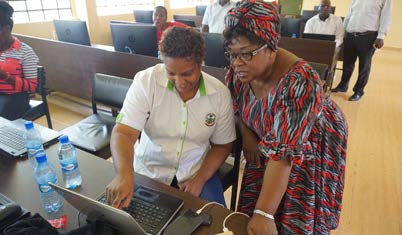
COL has been working with Kaimosi Friends University College (KAFUCO) to improve teacher capacity in blended learning. A workshop on blended course design in Kisumu, Kenya focused on using the Moodle learning management system to design and develop blended courses. The event followed a baseline study of TEL at KAFUCO, which revealed the need for institutional and systemic scaling up of TEL policy, resources and infrastructure to help boost the digital readiness of its learners and academics. COL has also assisted KAFUCO to develop a TEL policy. The study can be accessed here: hdl.handle.net/11599/3496
TOP 5
TIPS FOR BUILDING EDUCATION RESILIENCE
COVID-19 has forced educators across the Commonwealth and beyond to transition to online teaching practically overnight. For many, this was an entirely new experience and uncharted territory, presenting a formidable challenge but also an opportunity to embark on the road to building resilient education systems. Thinking beyond the current crisis, how can we integrate distance and online learning into all education systems for better resilience?
We should:
- Ensure access to ICT – Ensure access to ICT tools, and build the capacity of teachers and learners to use ICT effectively, while also
including low-tech solutions and options for those without ready access to devices or in locations where connectivity and bandwidth are unreliable. - Look for innovations to reach the unreached​ – Look for innovations to cater to the needs of marginalised communities and groups. Develop special initiatives for women and girls.
- Develop targeted approaches for persons with disabilities – Persons with disabilities require special supports and targeted technological solutions so they are not left behind in a crisis.
- Embed resilience in teacher training – Teacher training and professional development should include scenarios for coping with crises.
- Use open educational resource – The importance of access to learning materials cannot be overemphasised. OER can assist in making these accessible to all learners.
FOCUS
Building Resilience
Inspiring examples of how COL changes lives across the Commonwealth
L3F sets Ugandan widow up for success
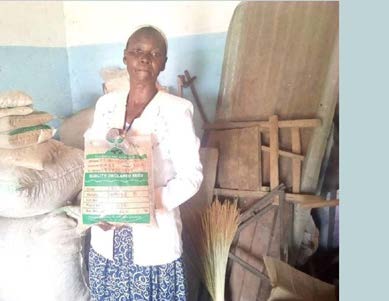
Betty Wule is a 40-year-old widow from a village in Uganda, who has to provide for her five children while also taking care of five orphans from her late relatives. COL’s L3F initiative, which integrates social, financial and human capital development, has allowed her to overcome barriers to sustainable and improved livelihood. Following an initial training in income-generating activities, she began selling baked goods. She also learned how to grow good varieties of cassava and started selling cuttings to other farmers in the area.
Betty then brought together a group of widows to share her newly acquired knowledge and skills. The group was introduced to an L3F learning platform that facilitates farmer capacity building in local languages, free of charge. Betty has now opened a store, where she sells different types of seeds, and has built a house with rooms for rent.
Fiji teacher’s learning journey during COVID-19
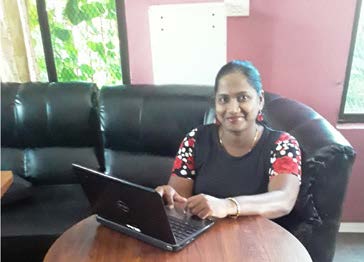
Mrs Nazmeen Raju is the acting Head of the Social Science Department at Sabeto College in Fiji. According to her, completing COL’s course on Using Open Educational Resources: An Introduction has been “the best decision” taken so far in 2020.
Most of her students come from families actively involved in farming in a semiurban area in Fiji, which is a well-known tourist destination. Many of them have been greatly affected by COVID-19.
Mrs Raju credits the course with enhancing her teaching through tools and knowledge that will greatly benefit her learners. She is now using SMS to contact her students and is ready to launch Google Classroom when they have access to email. “If you want to say that this COVID-19 era was not a waste, you can only do this by taking up this course. I feel like telling all the teachers to take this opportunity to learn and pass on the best to our students,” she says.
Unstable, expensive Internet no obstacle to young Ghanaian
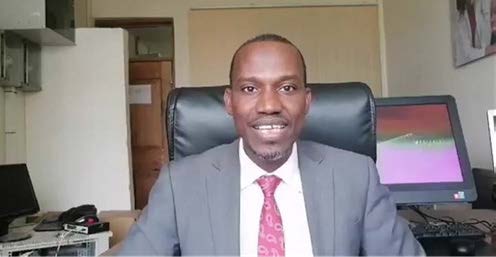
As a manager at Ghana’s National Health Insurance Authority (NHIA), Hassan Hamadu monitors and evaluates ICT projects across his region. He is al


